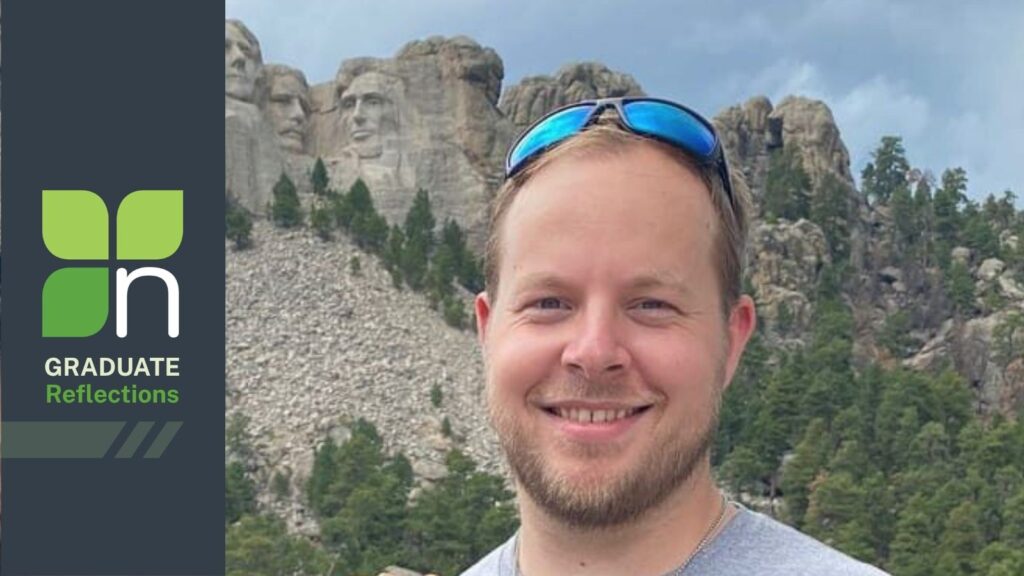NUNM-OCOM alumnus shares mission to provide holistic, non-invasive care.

Graduate Reflections were collected by the National University of Natural Medicine (NUNM) as part of an ongoing series to highlight 2025 Commencement.
Blake Underwood ’25
Program: Doctor of Acupuncture and Chinese Medicine (DACM), OCOM Teach-Out/Transfer Program
Blake Underwood first developed a passion for healthcare and helping others while working as a technician on an acute unit in a psychiatric hospital.
Working to support patients who were often unable to care for themselves, Underwood gradually found himself struggling to get enough sleep. This began his search for a solution.
In learning about acupuncture, a therapeutic modality he discovered to be associated with calming certain areas of the brain responsible for emotional regulation and nervous system function(1), he decided to try it out.
After just one session, he noted the ability to sleep for 10 hours uninterrupted.
Underwood, who earned a bachelor’s degree in exercise science and philosophy from Lipscomb University in Tennessee, later found an interest in evidence-informed practice while working at a men’s health organization.
As a traveling general manager for the company, he gained insight into both the financial aspects of healthcare and the role of physicians in monitoring and actively solving problems for patients.
“Medicine and patient care is more than scope of practice or reimbursement rates,” Underwood said. “It’s about providing anybody who walks through your door with therapeutic results that are replicable, reliable, and do not cause harm.”
Now a graduate of NUNM’s College of Classical Chinese Medicine, with a Doctor of Acupuncture and Chinese Medicine (DACM) degree earned through the Oregon College of Oriental Medicine (OCOM) Teach-out Transfer program, his goal is to continue strengthening his knowledge and clinical skills to help others heal.
In September, Underwood is set to join the campus community once again—this time as the Medicinary Manager at NUNM Health Centers. He also plans to transition into private practice, splitting time between working at a local clinic and teaching Taiji on the weekends.
Blake Underwood shared his journey to Chinese Medicine with NUNM and his commitment to treating others with non-invasive modalities to support long term health.
NUNM: Why is natural medicine important to you?
Underwood: Natural Medicine is how I have chosen to heal myself. Taiji/Qigong and Acupuncture have saved me from multiple surgeries, and TEAM herbal prescriptions have saved me from various internal medicine issues.
The fact that “strong medicines” exist, such as pharmacy and surgery, doesn’t necessitate an obligation to use them. Much can be accomplished without unnecessary invasiveness. My experience so far is that the tools we have can provide better and longer-lasting results for most ailments. Those that it can’t help probably do require pharmacy or surgery. Maybe one day I’ll invest more time into learning these aspects of Medicine, but I have plenty to work with for now.
How has your time at NUNM shaped your values or goals?
As an OCOM Teach-Out graduate, I owe NUNM the opportunity to complete my degree and sit for the boards without deviation from our curriculum. In fact, the university opened both its doors and classes for us OCOMers. I was fortunate enough to be exposed to Sotai and to use my hands in a different way than I had before, thanks to Daniel Silver, and to explore the depth of Functional Neurology with Douglas Windgate.
What we thought would be a limiting factor in our education turned out to be an expansion of our networks, knowledge, and experience, thanks to NUNM’s generosity and willingness to take us on.
What message do you have for those interested in your area of study or NUNM?
Traditional East Asian Medicine is one beast of a subject. Sometimes there can be conflicting viewpoints and favored methods of treatment, which can sometimes be challenging to intellectualize when trying to understand the bigger picture. “Yes, and that too” was something I would repeatedly tell myself during the program.
Knowledge from both the East and West have their places in patient care. Again, medicine is about therapeutic results that are replicable, reliable, and do not cause harm. Whether you choose to needle Spleen 6 (SP 6) to stimulate the L3/4 nerve roots centrally, and/or Tibialis Posterior/Tibial Neurovascular Bundle peripherally, “Tonify Earth through Metal” (Five Element Theory), or draw on the intersection of the 3 Yin Channels (Six Meridian Theory), you are likely to succeed in doing just that. If you can provide your patients with results, the theoretical framework you use doesn’t matter all that much.
The more you know and experience, the more confident you will be that you are indeed doing something beneficial for those you serve.
Research Cited
Wang, X., Wang, J., Han, R., Yu, C., & Shen, F. (2024). Neural circuit mechanisms of acupuncture effect: Where are we now? Frontiers in Neurology, 15, 1399925. https://doi.org/10.3389/fneur.2024.1399925. (1)
Written by Ashley Villarreal, NUNM Marketing Content Specialist, in collaboration with Blake Underwood, NUNM Alumni ’25.